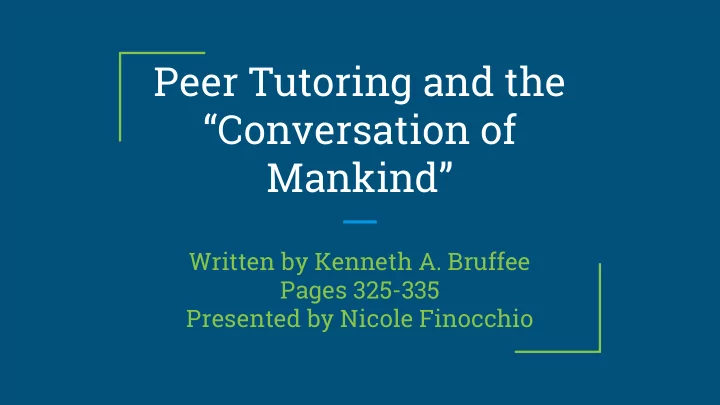

Peer Tutoring and the “Conversation of Mankind” Written by Kenneth A. Bruffee Pages 325-335 Presented by Nicole Finocchio
What is Peer Tutoring? Peer tutoring is when students with an in-depth knowledge about a specific ● area of study act as tutors for other students. ● For example, at Hofstra, the Writing Center and the Center for Academic Excellence are for the most part considered to be centers of peer tutoring.
Introduction Students coming into college had difficulty transitioning into the “normal” ● conventions of the college classroom no matter if they were weak or strong academically. Many students refused help when it was offered because they viewed it as, ● “an extension of the work, expectations, and above all the social structure of traditional classroom learning” (325). ● Students believe that going to their teachers for help, such as during their office hours, was as ineffective as sitting in class.
Introduction continued... Peer tutoring was the alternative teaching method instituted as a result of ● student's’ refusal to go to their teachers for help. ● Peer tutoring is a collaborative form of learning which differs from traditional learning with respect to the social context in which it is conducted. ● Peer tutoring helps the tutor and tutee. The tutee’s work improves and the tutor learns from the student and the tutoring process itself.
Conversation and the Origin of Thought Philosopher Michael Oakeshott has said that conversation happens “in ● public and within each of ourselves...conversation...gives place and character to every human activity and utterance” (326). Bruffee uses Oakeshott to identify that thought is derived from conversation. The public or social conversation that goes on within ourselves is referred to ● as reflective thought. ● Your thoughts are influenced by the way you speak in conversation. They follow the same style.
Conversation, Writing, and Peer Tutoring Bruffee’s view is “If thought is internalized conversation, then writing is ● internalized conversation re-externalized” (328). ● He believes that the ability to write depends on the ability to talk through a matter with oneself, which depends on one’s ability to directly converse with people in a social situation. ● He wants teachers and writing tutors to engage students in conversation for as much as the writing process as possible to help them develop their writing skills.
Peer Tutoring as Social Context According to Bruffee, peer tutoring gives students the social context to practice the academic style of conversation that teachers value and provides them with a community of peers like the one they will be writing for in the future (329).
Peer Tutoring as a Context for “Normal Discourse” Philosopher Richard Rorty said “normal discourse” is the kind of writing ● people do in their everyday lives (329). ● It also applies to conversations within a community of knowledgeable peers, “a group of people who accept, and whose work is guided by, the same paradigms and the same code of values and assumptions” (329). ● Peer tutoring is important because it provides a community of knowledgeable peers in which “normal discourse” can occur.
Objections to Peer Tutoring Bruffee points out the anxieties that teachers have about peer tutoring: “Isn’t ● it the blind leading the blind?” (330). ● He states that by pooling the tutee and tutor’s resources and working together, they can master the “normal discourse” as they are guided by the tutee’s assignment, the formal conventions of academic discourse, and standard written English (331).
Peer Tutoring and the Humanities Although humanists, including writing teachers, say they consider class ● discussion as an effective way of teaching, most class discussion involves little participation from students. In the Humanities, the emphasis is on the individual, not on the collaborative ● effort, so working together to gain knowledge is outside of the typical approach to this area of study.
Two Models of Knowledge Physicist and philosopher Thomas Kuhn’s view was that knowledge is a ● social artifact even in the natural sciences, which was based on his study of knowledge as it applies to the humanities and social sciences (332). Kuhn and Rorty both believed that knowledge is generated by communities ● of knowledgeable peers. ● Rorty’s view was that the communities generate knowledge by “socially justifying belief” (332). Bruffee concludes that “learning is an activity in which people work ● collaboratively to create knowledge among themselves by socially justifying belief” (332).
The Extensions of Peer Tutoring Knowledge is a state of being in “continual negotiation or conversation” ● (332). ● Education, according to Rorty, is the process of understanding what is happening by “joining the conversation of mankind” (332). Peer tutoring allows students to join this conversation. ● Peer tutoring plays a significant role in learning the humanities because it uses conversation to give students access to communities that will create knowledge.
The Last Frontier of Collaborative Learning According to Bruffee, in order for peer tutoring sessions to be effective, the ● tutors need to take a training course based on collaborative learning where it is an academically demanding environment and where tutoring is a genuine part of the tutors’ own educational development (334). People have always learned from their peers. ● ● Peer tutoring is a systematic use of collaborative principles that has made its way into educational institutions.
Works Cited Bruffee, Kenneth A. Peer Tutoring and the "Conversation of Mankind" . 1984. The Oxford Guide for Writing Tutors: Practice and Research . By Melissa Ianetta and Lauren Fitzgerald. New York: Oxford UP, 2016. 325-35. Print.
Recommend
More recommend